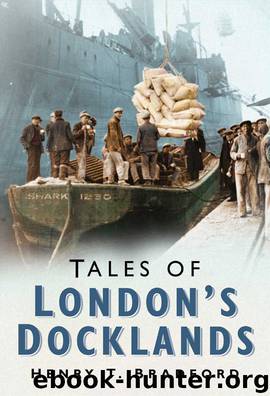Tales of London's Docklands by Henry T Bradford

Author:Henry T Bradford [Bradford, Henry T]
Language: eng
Format: epub
ISBN: 9780750953184
Publisher: The History Press
Published: 2013-07-11T22:00:00+00:00
12
JIM L., JOE B. AND THE
LAMB INCIDENT
Jim L. and Joe B. were brothers-in-law. Jim was married to Joe’s sister. It was no secret the two men hated each other, although no one knew why, only that they did and kept as far apart from each other as possible. They were similar, though, in a number of ways – just like the North and South poles.
The two brothers-in-law both worked in the same ship’s gang as me. Jim was one of the two pitch hands (men who were part of the ship’s gang, but worked on the quay or in lighters or barges) and Joe was the top hand (my eyes on a ship’s deck). I knew Jim’s face as well as I knew my own. I could see him and his mate on the pitch all day as they busied themselves with preparing cargo for loading. One or other of them was constantly looking up to see me in the crane cabin 60–80 feet above their heads, either to give me verbal orders or to make sign language that amounted to the same thing.
When Jim was bending down to his work, his black wavy hair stuck out of the yellow cravat he always wore to hide a wide, jagged scar that ran down the side of his neck. It made his hair resemble the black stigmas of a sunflower surrounded by bright-yellow petals. But as the day wore on and the sweat and dirt began to turn the yellow cravat a greasy brown colour, his head started to take on the look of a dying sunflower. That change in aspect always fascinated me. When I think of it now, it still does.
On the other hand, I could have passed Joe in the street without recognizing him. He was a lot older than Jim. Joe arrived at work at either 7 or 8 a.m., the start time depending on whether the ship was loading or discharging dry cargoes, or discharging frozen meats, cartons of offal, butter, cheeses or other chilled or frozen freight.
A normal day’s loading work ran from 8 a.m. until 7 p.m. However, discharging a meat-carrying ship began at 7 a.m. and finished at 8 p.m. The reason for the earlier start and later finish was that freezer hatches were sealed with large caulk-filled plugs, which had to be removed before the ship’s discharging gang could start work and then replaced at knocking-off time. The quay gang called a halt to the day’s work when all the road transport lorries had been filled with frozen cargo or at 7 p.m., whichever came first. Four down-holders, the top hand and the crane driver then replugged and resealed the freezer hatch.
Joe, my top hand, always made his way up onto the ship’s deck as soon as he arrived at work, and that’s where he stayed till lunchtime, which was midday. Before the afternoon work period began at 1 p.m., Joe would again make his way up on deck, where he remained till seven or eight o’clock in the evening.
Download
This site does not store any files on its server. We only index and link to content provided by other sites. Please contact the content providers to delete copyright contents if any and email us, we'll remove relevant links or contents immediately.
Cecilia; Or, Memoirs of an Heiress — Volume 1 by Fanny Burney(32558)
The Great Music City by Andrea Baker(32018)
Cecilia; Or, Memoirs of an Heiress — Volume 2 by Fanny Burney(31956)
Cecilia; Or, Memoirs of an Heiress — Volume 3 by Fanny Burney(31941)
We're Going to Need More Wine by Gabrielle Union(19046)
All the Missing Girls by Megan Miranda(16024)
Pimp by Iceberg Slim(14506)
For the Love of Europe by Rick Steves(14121)
Bombshells: Glamour Girls of a Lifetime by Sullivan Steve(14073)
Talking to Strangers by Malcolm Gladwell(13370)
Norse Mythology by Gaiman Neil(13363)
Fifty Shades Freed by E L James(13239)
Mindhunter: Inside the FBI's Elite Serial Crime Unit by John E. Douglas & Mark Olshaker(9339)
Crazy Rich Asians by Kevin Kwan(9291)
The Lost Art of Listening by Michael P. Nichols(7506)
Enlightenment Now: The Case for Reason, Science, Humanism, and Progress by Steven Pinker(7311)
The Four Agreements by Don Miguel Ruiz(6765)
Bad Blood by John Carreyrou(6621)
Weapons of Math Destruction by Cathy O'Neil(6279)
